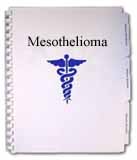|
Mesothelioma and Lung Cancer News - Return to Menu
Surviving Mesothelioma, a Terminal Cancer: Paul Kraus' Remarkable Story
The Premier Edition of Cancer Monthly’s CancerWire focuses on mesothelioma and how one patient has survived a terminal diagnosis. Like Cancer Monthly, the focus of CancerWire is on treatment results. While, Cancer Monthly reports the cancer treatments results published in the peer reviewed medical literature, CancerWire reports on results that have not yet enjoyed the visibility of a major Phase I, II, or III clinical trial. This may include the extraordinary results a patient experienced by trying a new or innovative approach or the results achieved by a researcher or physician as they treat cancer patients in their hospital or clinic.
(PRWEB) March 18, 2005 – For anyone faced with a dire prognosis of cancer or any other disease, the following interview will inspire you. In the annals of cancer, mesothelioma is one of the worst possible types of cancer to have. In the words of oncologists it has a "dismal therapeutic outcome"¹ and is "an aggressive incurable tumor."² The median survival from diagnosis ranges from 6 to 18 months³.
Despite this prognosis, Mr. Paul Kraus is alive nearly 8 years after he was diagnosed with peritoneal mesothelioma. What is equally remarkable is that Mr. Kraus had no orthodox cancer therapies - he opted to say 'no' to chemotherapy, surgery, and radiation. Instead, Mr. Kraus made radical lifestyle changes, altering his diet, using intravenous and oral vitamins, herbs, amino acids and other immune boosting therapies and supplements, and tapping into the power of the mind-body connection.
The Interview
Cancer Monthly: Paul can you tell us when you were diagnosed and what types of symptoms you experienced that led to your diagnosis?
PK: I was diagnosed at the end of June 1997. The only symptom I had was a very bloated abdomen. I did not have any pain. I actually went into the hospital for an umbilical hernia repair and the cancer was an accidental finding. During the surgery the surgeon removed a lot of fluid from my abdomen. He also conducted a laparoscopic examination that revealed widespread metastases. He first thought that I had metastatic pancreatic cancer. It took two or three weeks for the pathology to come back from Sydney and say that in fact it was mesothelioma.
Cancer Monthly: And that diagnosis was reconfirmed by another hospital?
PK: Yes, my pathology was sent to Australia's leading pathologist in mesothelioma cases, Professor Douglas Henderson of Adelaide. They had two teams of pathologists verify and confirm the diagnosis. In fact, it was confirmed as peritoneal or abdominal rather than pleural mesothelioma. This is a very unusual subtype, even within the annals of mesothelioma.
Cancer Monthly: Does peritoneal mesothelioma have the same kind of dire prognosis as the more frequently encountered pleural mesothelioma?
PK: Yes. In fact, when we first went to a professor of oncology in Sydney, we thought that peritoneal is less dangerous than pleural. He shook his head and said, "Oh, no, oh no. In fact, in some ways it is even more difficult." To read the rest of the interview go to https://www.cancermonthly.com
Comments
Alternative Intravenous Therapies in Cancer: Richard Kinsolving, Ph.D.,Immune Recovery Foundation https://www.immunerecovery.net/index.htm
The treatments employed by Mr. Kraus are among many of the "standards" in alternative medicine. Unfortunately, it is often difficult to ascribe the exact degree of for each individual component in a treatment, as they so seldom have been used exclusively as a single agent. Clearly, the major contributors to his favorable outcome are the intravenous ascorbic acid (vitamin C), Ukraine, and to a lesser extent, ozone…To read the rest of Dr. Richard Kinsolving’s comments go to https://www.cancermonthly.com
Cancer and the Immune System: Devin Ryerson, D.O. Pure Prescriptions www.pureprescriptions.com
After reading Mr. Kraus' interview, I found it to be both amazing and inspirational. I'm also connected to his story on a personal level. Being a cancer survivor myself and losing my father to this epidemic, I can certainly relate to what Mr. Kraus describes as a "...struggle with myself, with my constant fears and doubts." To read the rest of Dr. Devin Ryerson’s comments go to https://www.cancermonthly.com
The Mind/Body Connection: Wendy Goldner: The Wild Divine Project https://www.wilddivine.com/CancerMonthly_WildDivine/
I was impressed with Paul Kraus' ability to articulate the role the mind has in potentially contributing to disease and in helping one to overcome one's diagnosis. There is a great deal of scientific and medical literature describing how stress can pressure the body and leads to some form dis-ease. Whether it's hypertension, migraines, depression, anxiety, chronic fatigue or cancer - stress takes its toll on both the physical and mental well-being. To read the rest of Wendy Goldner’s comments go to https://www.cancermonthly.com
To subscribe to CancerWire go to: https://www.cancermonthly.com
# # #
Disclaimer - Please Read:
Of course, none of this information in CancerWire is a substitute for professional medical advice, examination, diagnosis or treatment and you should always seek the advice of your physician or other qualified health professional before starting any new treatment or making any changes to an existing treatment. No information contained in Cancer Monthly or CancerWire including the information above, should be used to diagnose, treat, cure or prevent any disease without the supervision of a medical doctor.
¹ Phase II trial of a single weekly intravenous dose of ranpirnase in patients with unresectable malignant mesothelioma. Mikulski SM, et al., J Clin Oncol. 2002 Jan 1;20(1):274-81.
² A multicentre phase II study of cisplatin and gemcitabine for malignant mesothelioma. Nowak AK, et al., Br J Cancer. 2002 Aug 27;87(5):491-6.
³ A multicentre phase II study of cisplatin and gemcitabine for malignant mesothelioma. Nowak AK, et al., Br J Cancer. 2002 Aug 27;87(5):491-6.
|

































